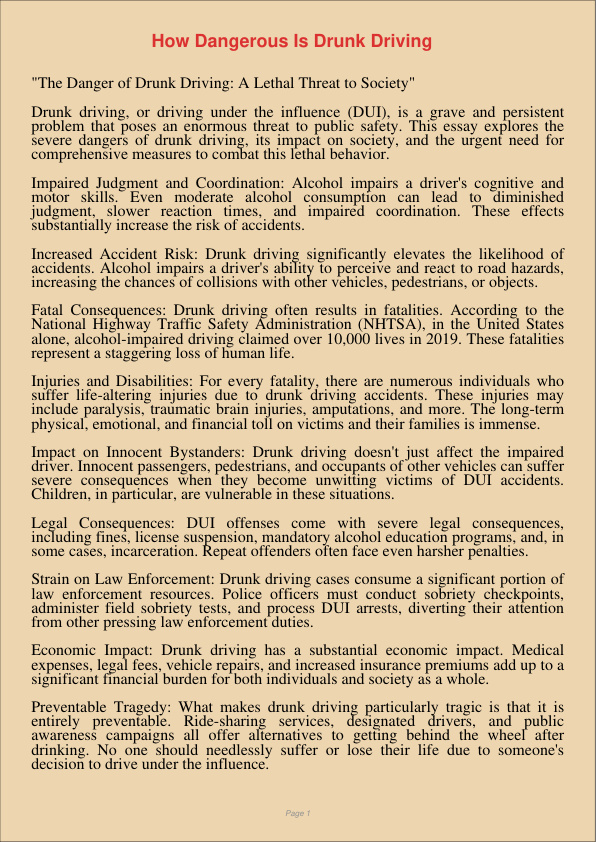“The Danger of Drunk Driving: A Lethal Threat to Society”
Drunk driving, or driving under the influence (DUI), is a grave and persistent problem that poses an enormous threat to public safety. This essay explores the severe dangers of drunk driving, its impact on society, and the urgent need for comprehensive measures to combat this lethal behavior.
Impaired Judgment and Coordination: Alcohol impairs a driver’s cognitive and motor skills. Even moderate alcohol consumption can lead to diminished judgment, slower reaction times, and impaired coordination. These effects substantially increase the risk of accidents.
Increased Accident Risk: Drunk driving significantly elevates the likelihood of accidents. Alcohol impairs a driver’s ability to perceive and react to road hazards, increasing the chances of collisions with other vehicles, pedestrians, or objects.
Fatal Consequences: Drunk driving often results in fatalities. According to the National Highway Traffic Safety Administration (NHTSA), in the United States alone, alcohol-impaired driving claimed over 10,000 lives in 2019. These fatalities represent a staggering loss of human life.
Injuries and Disabilities: For every fatality, there are numerous individuals who suffer life-altering injuries due to drunk driving accidents. These injuries may include paralysis, traumatic brain injuries, amputations, and more. The long-term physical, emotional, and financial toll on victims and their families is immense.
Impact on Innocent Bystanders: Drunk driving doesn’t just affect the impaired driver. Innocent passengers, pedestrians, and occupants of other vehicles can suffer severe consequences when they become unwitting victims of DUI accidents. Children, in particular, are vulnerable in these situations.
Legal Consequences: DUI offenses come with severe legal consequences, including fines, license suspension, mandatory alcohol education programs, and, in some cases, incarceration. Repeat offenders often face even harsher penalties.
Strain on Law Enforcement: Drunk driving cases consume a significant portion of law enforcement resources. Police officers must conduct sobriety checkpoints, administer field sobriety tests, and process DUI arrests, diverting their attention from other pressing law enforcement duties.
Economic Impact: Drunk driving has a substantial economic impact. Medical expenses, legal fees, vehicle repairs, and increased insurance premiums add up to a significant financial burden for both individuals and society as a whole.
Preventable Tragedy: What makes drunk driving particularly tragic is that it is entirely preventable. Ride-sharing services, designated drivers, and public awareness campaigns all offer alternatives to getting behind the wheel after drinking. No one should needlessly suffer or lose their life due to someone’s decision to drive under the influence.
Social Responsibility: Society as a whole bears the burden of drunk driving. The responsibility to combat this menace lies with individuals, communities, law enforcement, and lawmakers. Effective prevention efforts include education, stricter enforcement of DUI laws, and a collective commitment to ensuring the safety of all road users.
In conclusion, drunk driving poses a severe and pervasive danger to society. It leads to a significant loss of life, causes debilitating injuries, strains public resources, and carries hefty legal and financial consequences. The continued prevalence of this problem underscores the urgent need for comprehensive measures, including education, stricter enforcement, and the promotion of alternative transportation options, to eradicate this lethal threat to public safety. It is a shared responsibility to protect lives and prevent the heartache and devastation caused by drunk driving.

「真诚赞赏,手留余香」
真诚赞赏,手留余香
使用微信扫描二维码完成支付
